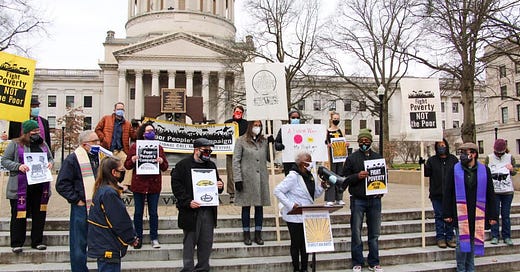W.V. Poor People's Campaign calls for legislation to combat poverty
“We have seen here in this state that our legislators do not care about poor people who don’t vote."
Photo courtesy of W.V. Poor People’s Campaign
By DOUGLAS J HARDING
Organizers with the West Virginia Poor People’s Campaign visited the state Capitol in Charleston Monday to demand legislators support policies that uplift poverty-stricken and otherwise oppressed communities.
“We have seen here in this state that our legislators do not care about poor people who don’t vote,” said Rev. Kayla Parker. “Our legislators do not care about poor people who use drugs. They do not care about poor people who are Black, who are Latina, who are indigenous, who are Asian or who are Native. They do not care about poor people who are queer and trans. They do not care.”
Rev. Parker said many elected officials are interested only in using their positions of power to further enrich and empower themselves.
Poor and oppressed people, she said, must stand together in unity to demand lawmakers enact policies that meet their needs and support their interests.
“Many [legislators] have used their power and privilege and wealth to lift themselves up,” Rev. Parker said. “They need to be moved by our pressure. They need us in their offices. They need us at their doors. It is our task to connect them with their humanity, their divinity and their duty to protect all of us they are meant to be serving.”
According to the Poor People’s Campaign’s Jubilee Policy Platform, protecting vulnerable communities means using all available political power to enact policies such as universal healthcare and housing, a $15 minimum wage, a federal jobs program, a wealth tax and expanded voting rights. The platform also states that presidential administrations should “Redirect the bloated Pentagon budget towards these priorities as matters of national security, use the power of executive orders [and] work with the Poor People’s Campaign to establish a permanent Presidential Council to advocate for this bold agenda.”
Martec Washington, of Charleston, said that while the U.S. is meant to be a “free” country, Black men and women like himself cannot truly be free until their human rights are guaranteed to them by law.
“My hair can get me evicted. My color can get me arrested. I can be unemployed with no help—and I’m a free citizen in a free land,” Washington said. “Free how? Where are my rights? I’m only a free citizen in a free land if my rights are there. But that’s only if I’m worth enough, only if I count.”
Washington said the rights and the needs of poor and oppressed people are only considered by lawmakers when they are acting—or considering to act—in a way which takes away those rights for profits rather than actually ensuring them for justice.
“I count when I bring dollars into this state as a citizen,” Washington said. “I count when I help you out economically and I’m bringing in money. Why can’t I count when I need a house? When I need help? I count when you want to put me in jail because you need funding. But I don’t count as a citizen when I’m homeless, when I’m poor, when I’m strung out on drugs, when I’m uneducated or when I’m Black.”
Washington ended his speech expressing exhaustion from constantly being forced to fight for human rights which are meant to be ensured by the Constitution and by law—but also with a call to action.
“I’m going to say it again: I stand before you as an unemployed, Black, unfree citizen—So, what are you going to do to change it?” Washington said. “I’m tired. We are all tired. But guess what? Until I’m free, you’re going to keep seeing me, and you’re going to keep seeing all of us. We’re going to be free one way or another.”
Pamela Garrison, another W.V. Poor People’s Campaign organizer, said almost all legislation passed in the state serves to benefit already-wealthy entities while ensuring poor people remain poor.
“The policies we see keep the people on the bottom and put the wealthiest corporations and most privileged people even more ahead,” Garrison said. “And they’re supposed to be ‘for the people.’”
Garrison, said she, too, is tired, but she won’t let exhaustion stop her from fighting for a better, more just life for oppressed people across the state and around the world.
“We are tired of waiting. We are tired of the weights we bear on our shoulders,” Garrison said. “Our hearts are tired from crying over the injustices we see and the immoral policies we’re seeing introduced and passed. But we aren’t going anywhere except forward—not one step back.”
Monday’s demonstration at the Capitol was part of the national Poor People’s Campaign’s most recent Moral Monday initiative, when “Poor and low-income people came out in 30 states and Washington, D.C. posting their demands at state houses and demanding a moral agenda for the country that includes voting rights, which is essential to making all other rights promised in this country a reality.”
To view the full Poor People’s Campaign’s Jubilee Policy Platform and to sign your name in support of the 14 policy initiatives it prescribes, visit this webpage.
The West Virginia Holler is an affiliate of The Tennessee Holler and is powered, in part, by West Virginia Can’t Wait.
Follow the Holler on Twitter @HollerWV and Instagram @WVHoller. We're on Facebook too!
Follow writer Douglas J. Harding @douglasjharding. 



